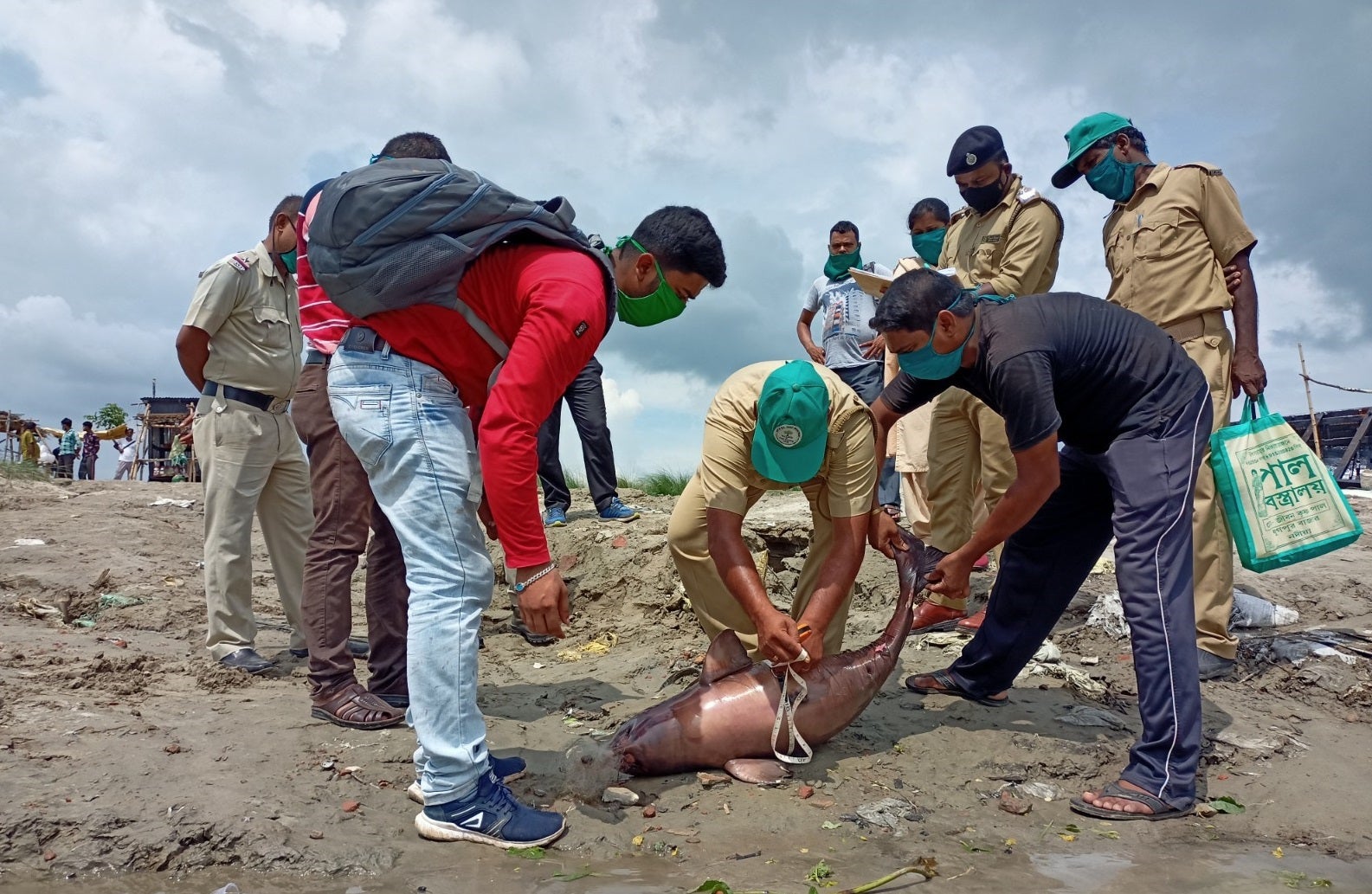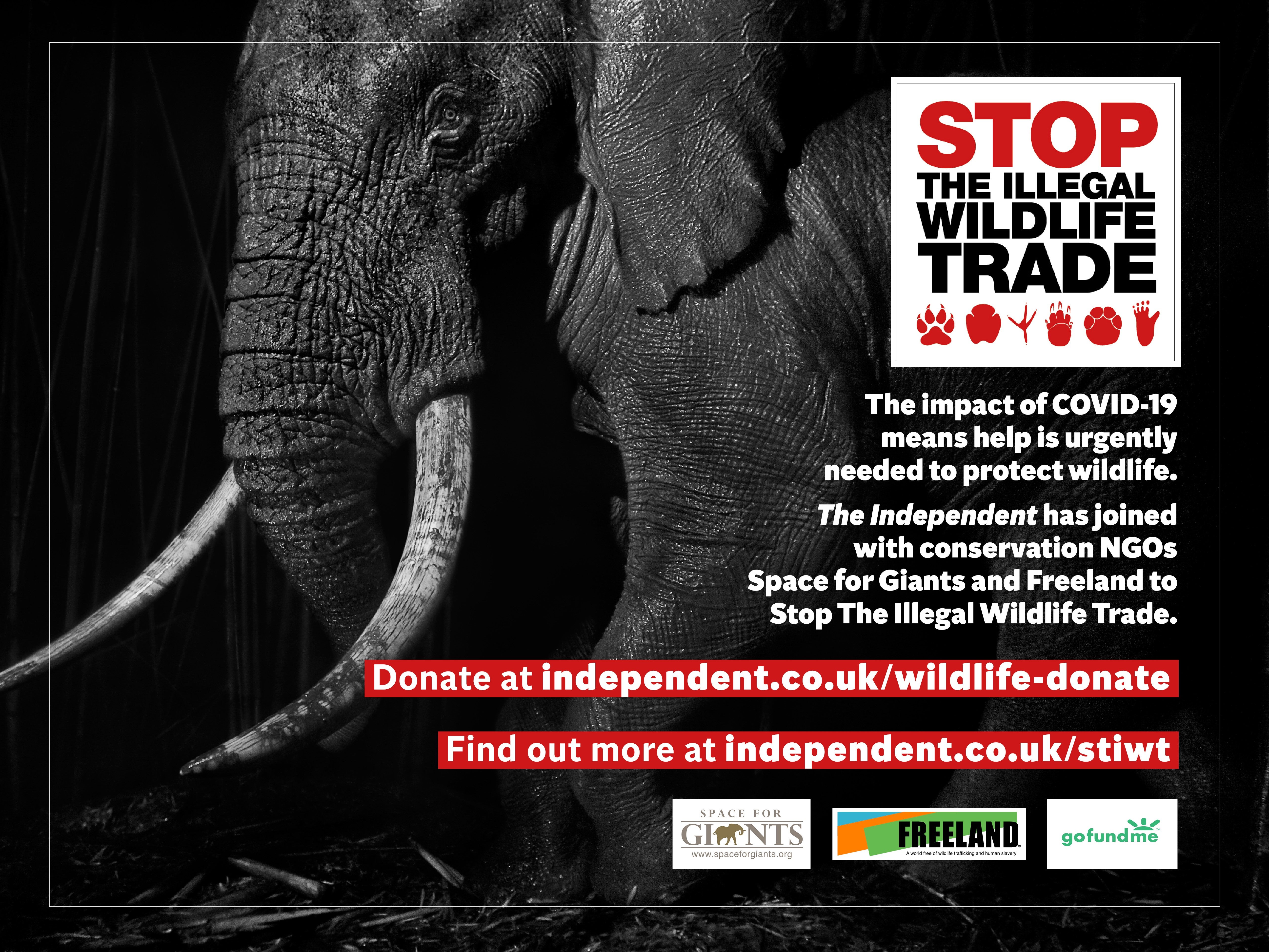How illegal trade in bait oil is putting Ganges river dolphin at risk
Activists and conservationists tell Namita Singh dolphins are killed in India for oil used in fishing


Ganesh Chowdhury, was on his way home from the office when he received a phone call from a friend. “There is a dolphin that has been accidentally caught, and it is now stuck in the fishing net,” the friend told him. “Please come here fast.”
While on his way, Mr Chowdhury, 30, a resident of the eastern Indian state of West Bengal, instructed the caller to not pull the net. “It could have fatally injured the dolphin,” he tells The Independent.
“I immediately called the forest department, which also told me to reach the spot,” he says. “But by the time I reached there, the dolphin, which was on its way to one shore, was now somewhere near Nadia district. So, we went into the water with our boat.”
“Somewhere in the river, we saw the dolphin that was still stuck in the net. The moment I held the fishing net, the dolphin pulled away so hard that the net came off. It was free to go its own way,” he says.
Mr Chowdhury, a conservationist, has to inform the forest officials each time he hears from fishermen or friends about a Ganges river dolphin being stranded or found dead in his district. This is because dolphins are protected under the first schedule of the Wildlife Protection Act, meaning they are prohibited from being hunted throughout India. Their poaching can lead to imprisonment of up to seven years.
But there is another fear that drives Mr Chowdhury’s work to save the dolphins. He knows that not all captures are unintentional and not all killings are accidental. Some of the dolphins are killed to extract their oil, which is then used as bait for catching catfish, shares Chaudhury. “These instances are hard to detect because the farmers who extract dolphin oil, do it carefully,” he says.
His fears are not unfounded. A report by a local NGO called Human and Environment Alliance League (HEAL) found in 2019 a number of dolphins along the river banks of Malda and Murshidabad district in West Bengal were killed for bait oil. The researchers carried out field visits at multiple sites across the stretch and met fishermen who had stored dolphin oil in containers of up to 20 litres, with some containing oil from a dolphin killed about just a week before.
“When a dolphin gets caught accidentally or intentionally in fishing nets, the fishermen either retain the carcass if the dolphin is dead or if the dolphin is still alive, they capture and kill it. Young dolphins are more prone to get trapped in nets,” said the report.
Stop the Illegal Wildlife Trade
We are working with conservation charities Space for Giants and Freeland to protect wildlife at risk from poachers due to the conservation funding crisis caused by Covid-19. Help is desperately needed to support wildlife rangers, local communities and law enforcement personnel to prevent wildlife crime. Donate to help Stop the Illegal Wildlife Trade HERE.
“The dolphins are then cut up and the blubber and oil stored in drums,” explains Meghna Banerjee, a member of the NGO. “They let the oil stay there to ferment. When the flesh goes down, the oil is what is remaining at the top of the drum. They take the oil and sell it in the market.” The oil is used for fish baits and is said to treat joint pain. “The oil is said to gain its properties within a few months after its extraction. This means, the older the oil, the better and costlier.”
In their investigation between October and November 2019, HEAL found that the oil was sold at a price ranging from anywhere between Rs 1,200 per kg (£11.61) to Rs 2,000 (£19.48) per kg.
But authorities believe HEAL’s research does not reflect the true situation on the ground. When The Independent reached out to Vinod Kumar Yadav, chief wildlife warden of West Bengal for comment on the report, he dismissed, it saying “there are no kind of intentional killings of dolphins” in the state, declining to comment further.
Dr Saket Badola, the head of TRAFFIC India, however, said hunting of dolphins is an issue in general and that even the non-targeted deaths due to net entanglement contribute to the dolphin oil market for oil-bait fishing.
“It may not be targeted hunting, but there is a demand for their oil. So, even if a dolphin is caught accidentally in some net somewhere, then also there is a risk that they are not released back,” he tells The Independent. “All fishermen know that this oil has some value or that they know that this oil can be sold in the market. And that is the primary challenge in their conservation as far as hunting and poaching is concerned.”
According to a 2020 research paper by Wildlife Institute of India, about 64 per cent of the participating fishermen used dolphin oil as bait, while about 62 per cent considers dolphin oil better than other oils for catching catfish.

The paper, titled as Evidence for the continued use of river dolphin oil for bait fishing and traditional medicine: implications for conservation, argued that dolphin oil continues to be in use despite the availability of alternative bait oil such as sardine oil and fish oil.
The co-authors of the paper, Dr Vishnupriya Kolipakam and Professor Qamar Qureshi say that this trade is unorganised and limited to northern and northeastern states of Uttar Pradesh, Bihar, West Bengal and Assam. “There is no international trade of this oil,” they tell The Independent. “The people who indulge in this are the poorest of the poor.”
However, they also argue: “whether used for oil or not, entanglement is a big problem for dolphins as it has led to a lot of dolphin deaths,” adding that from rough extrapolation, they found that about 50 to 60 dolphins die each year.
This number should be prompt concern, says Dr Kolipakam, because a dolphin comes to maturity after three years. “It gives birth to only one calf. So, for such a species, even an offtake of 10 per cent can lead to a drastic decline. Because that population is not going to recover so fast,” adds Dr Kolipakam.
Prof Qureshi blames the entanglement deaths on the gill net that are used in fisheries. “The rivers are fished all along and the entire river is a fishing habitat. For dolphins to navigate through it means they will get entangled at one point or the other,” says Prof Qureshi.
“But the mosquito net sweeps off anything and everything from the water, which is very harmful to the ecosystem. Many times, fishing nets are simply disposed of in the water. Many aquatic animals get entangled and die. Over time the use of the traditional net, which is known to have larger mesh, has declined and the mosquito net has increased. This has led to overfishing. ”
The researchers believe that a part of the problem can be solved if the government creates temporary fish sanctuaries.
“It is not possible to have enforcement throughout the stretch of the river. But to have some kind of mechanism to have a temporary fish sanctuary will not only help the fish population but also the fishermen,” says Dr Kolipakam.
Prof Qureshi believes that this can be done if the government declares certain areas as fish sanctuary for a few years and then moves to another area after that. “Though the current fishery law has provision for declaring an area a temporary fish sanctuary, it is not practised,” he says. “It is important to understand that we are not dealing with terrestrial habitat and these rivers are not rocky. These rivers change on an annual basis as flood patterns change,” says Prof Qureshi.
“It is a very sustainable way of fishing, it will create the fish stock and help dolphins and many other endangered faunas. It also helps the local fishermen,” adds Dr Kolipakam.
Join our commenting forum
Join thought-provoking conversations, follow other Independent readers and see their replies
Comments
Bookmark popover
Removed from bookmarks